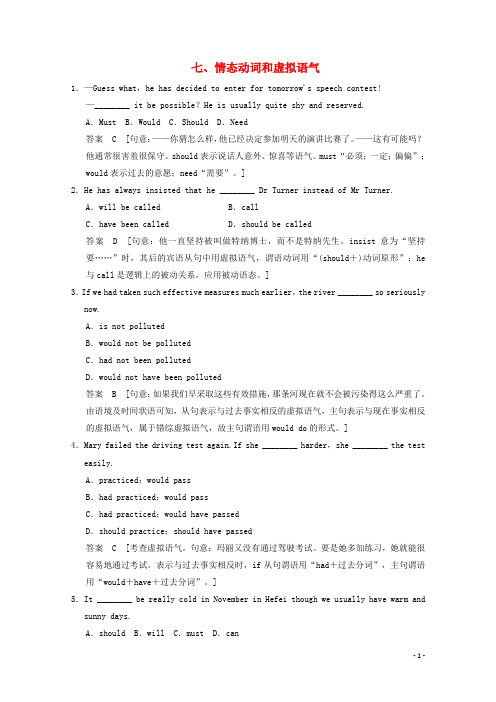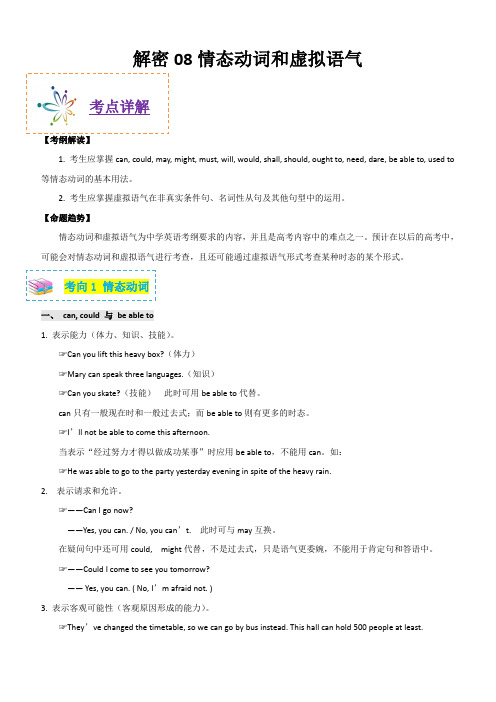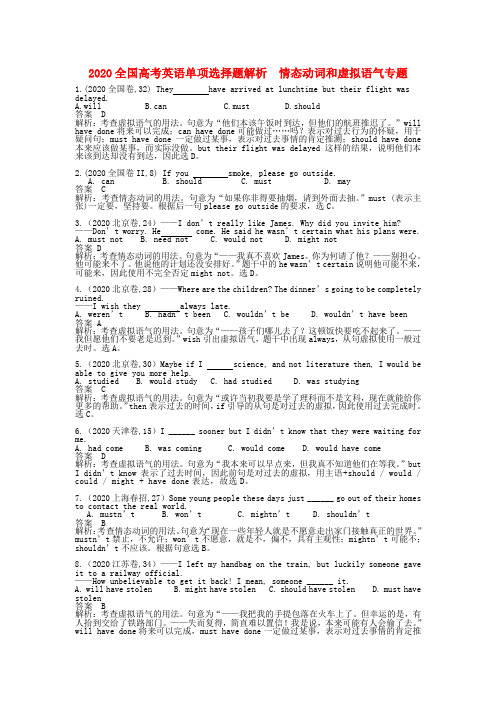2020高考英语 指导分项历炼 专题七情态动词、虚拟语气
高考英语一轮复习 高频语法训练 附录7 情态动词和虚拟

七、情态动词和虚拟语气1.—Guess what,he has decided to enter for tomorrow's speech contest!—________ it be possible?He is usually quite shy and reserved.A.Must B.Would C.Should D.Need答案 C [句意:——你猜怎么样,他已经决定参加明天的演讲比赛了。
——这有可能吗?他通常很害羞很保守。
should表示说话人意外、惊喜等语气。
must“必须;一定;偏偏”;would表示过去的意愿;need“需要”。
]2.He has always insisted that he ________ Dr Turner instead of Mr Turner.A.will be called B.callC.have been called D.should be called答案 D [句意:他一直坚持被叫做特纳博士,而不是特纳先生。
insist意为“坚持要……”时,其后的宾语从句中用虚拟语气,谓语动词用“(should+)动词原形”;he 与call是逻辑上的被动关系,应用被动语态。
]3.If we had taken such effective measures much earlier,the river ________ so seriously now.A.is not pollutedB.would not be pollutedC.had not been pollutedD.would not have been polluted答案 B [句意:如果我们早采取这些有效措施,那条河现在就不会被污染得这么严重了。
由语境及时间状语可知,从句表示与过去事实相反的虚拟语气,主句表示与现在事实相反的虚拟语气,属于错综虚拟语气,故主句谓语用would do的形式。
2020年高考英语之高频考点解密八 情态动词和虚拟语气附解析

解密08情态动词和虚拟语气考点详解【考纲解读】1. 考生应掌握can, could, may, might, must, will, would, shall, should, ought to, need, dare, be able to, used to 等情态动词的基本用法。
2. 考生应掌握虚拟语气在非真实条件句、名词性从句及其他句型中的运用。
【命题趋势】情态动词和虚拟语气为中学英语考纲要求的内容,并且是高考内容中的难点之一。
预计在以后的高考中,可能会对情态动词和虚拟语气进行考查,且还可能通过虚拟语气形式考查某种时态的某个形式。
考向1 情态动词一、can, could 与be able to1. 表示能力(体力、知识、技能)。
☞Can you lift this heavy box?(体力)☞Mary can speak three languages.(知识)☞Can you skate?(技能)此时可用be able to代替。
can只有一般现在时和一般过去式;而be able to则有更多的时态。
☞I’ll not be able to come this afternoon.当表示“经过努力才得以做成功某事”时应用be able to,不能用can。
如:☞He was able to go to the party yesterday evening in spite of the heavy rain.2. 表示请求和允许。
☞——Can I go now?——Yes, you can. / No, you can’t. 此时可与may互换。
在疑问句中还可用could, might代替,不是过去式,只是语气更委婉,不能用于肯定句和答语中。
☞——Could I come to see you tomorrow?—— Yes, you can. ( No, I’m afraid not. )3. 表示客观可能性(客观原因形成的能力)。
2020年高考英语语法必考考点 8 虚拟语气及情态动词

2020年高考英语语法必考考点(8)虚拟语气及情态动词【考点解读】 情态动词是每年高考的热点也是难点,每年单项填空题必考一题。
考点集中在:情态动词表示推测的基本用法及区别;情态动词否定式的用法辨析:“情态动词+have done”的用法区别等。
虚拟语气在高考命题中不是重点,但是难点。
考点常集中在含蓄条件句以及主语、宾语从句等特定句型中虚拟语气的使用上,因此考生应熟练掌握含蓄条件句中主从句的时态要求以及一些典型句型中虚拟语气的具体形式。
虚拟语气考点透析 考点一、虚拟语气的基本用法 1.与现在事实相反的虚拟语气,基本结构为:主语+动词的一般过去时(be动词用were)+其他成分+if +should/would/could...+动词原形+其他成分。
例如: ①If it were not for the fact that she ______ sing,I would invite her to the party.A. couldn’tB. shouldn’tC. can’tD. might not 解析句意为:如果不是因为她不会唱歌的事实,我会邀请她来参加那次聚会的。
that从句为同位语从句,描述的是事实,用陈述语气。
正确答案为C。
2.与过去事实相反的虚拟语气,基本结构为:主语+动词的过去完成时+其他成分+if +should/would/could...+have done+其他成分。
例如: If the weather had been better,we could have had a picnic. But it ______ all day.A. rainedB. rainsC. has rainedD.is raining 解析句意为:如果天气好的话,我们是能够去野餐的,但是下了一天的雨。
句子前半部分陈述的是与过去事实相反的事情,所以用了虚拟语气。
“下了一天的雨”是事实,所以用陈述语气。
2020全国高考英语 单项选择题解析 情态动词和虚拟语气专题

2020全国高考英语单项选择题解析情态动词和虚拟语气专题1.(2020全国卷,32) They have arrived at lunchtime but their flight was delayed.A.willB.canC.mustD.should答案 D解析:考查虚拟语气的用法。
句意为“他们本该午饭时到达,但他们的航班推迟了。
”will have done将来可以完成;can have done可能做过……吗?表示对过去行为的怀疑,用于疑问句;must have done一定做过某事,表示对过去事情的肯定推测;should have done 本来应该做某事,而实际没做。
but their flight was delayed这样的结果,说明他们本来该到达却没有到达,因此选D。
2.(2020全国卷II,8) If you smoke, please go outside.A. canB. shouldC. mustD. may答案 C解析:考查情态动词的用法。
句意为“如果你非得要抽烟,请到外面去抽。
”must (表示主张)一定要,坚持要。
根据后一句please go outside的要求,选C。
3.(2020北京卷,24)——I don’t really like Ja mes. Why did you invite him? ——Don’t worry. He come. He said he wasn’t certain what his plans were.A. must notB. need notC. would notD. might not答案 D解析:考查情态动词的用法。
句意为“——我真不喜欢James。
你为何请了他?——别担心。
他可能来不了。
他说他的计划还没安排好。
”题干中的he wasn’t certain说明他可能不来,可能来,因此使用不完全否定might not。
语法专题7情态动词和虚拟语气

语法专题7情态动词和虚拟语⽓情态动词的⽤法情态动词表⽰说话⼈对某⼀动作或状态的态度,可以表⽰“可能”、“可以”、“需要”、“必须”或“应当”等之意。
情态动词没有⼈称和数的变化。
但不能单独作谓语动词⽤,必须和不带to的不定式连⽤构成谓语动词。
只有情态动词ought要和带to的动词不定式连⽤,在句中作谓语⽤。
将情态动词置于主语之前即构成其疑问式,在情态动词之后加not既构成其否定式。
现将各情态动词的基本⽤法分述如下:1、can和could (could为can的过去式) 的基本⽤法(1)表⽰能⼒,如:He can speak English better than you.(2)在疑问句和否定句中表⽰“怀疑”、“猜测”或“可能性”,如:Can thisgreen bike be Liu Dong's?(3)表⽰“许可”时can可以和may换⽤,如:You can (may) go home now.(4)如果要表⽰语⽓婉转,可⽤could代替can,这时could不再是can 的过去式,如:Could you come again tomorrow? (5)can和be able to 都可表⽰能⼒,两者在意思上没有什么区别。
但是can只能有现在式和过去式,⽽be able to则有更多的形式,如:He will be able to do thework better.2、may和might (might为may的过去式)的基本⽤法(1)表⽰允许或征询对⽅许可,有“可以”之意,如:You may use my dictionary. 在回答对⽅说“可以做某事”或“不可以做某事”时,⼀般多不⽤may或may not,以避免语⽓⽣硬或不容⽓。
⽽⽤⽐较婉转的说法进⾏回答。
如:---- May I use this dictionary? ---- Yes, please. 或---- Certainly. 在请求对⽅许可时,如果Might I…? 就⽐⽤May I…? 语⽓更婉转些,如:May I have a look at your new computer? 但是表⽰“阻⽌”或“禁⽌”对⽅做某事时,要⽤must not代替may not,如:---- May we swim in this lake? ---- No, you mustn?t. It?s too dangerous. (2)may或might都可以表⽰可能性,表⽰“或许”、“可能”之意,如果⽤might表⽰可能性,则语⽓更加不肯定,如:They may (might) bein the library now .3、must的基本⽤法(1)must表⽰“必须”、“应该”之意,其否定式must not,缩写形式为mustn't,表⽰“不应该”,“不准”、“不许可”或“禁⽌”之意,如:We must study hard and make progress every day. You mustn't touch the fire. (2)对以must提出的疑问句,如作否定回答时,要⽤needn't或⽤don't (doesn't) have to (不必)来回答,⽽不⽤mustn't,因为mustn't表⽰的是“禁⽌”或“不许可”之意,如:---- Must we finish the work tomorrow? ---- No, you needn't (don't have to), but you must finish it in three days.(3)在肯定句中must可以表⽰推测,表⽰“⼀定”或“必定”之意,如:---- Whose new bike can it be? ---- It must be Liu Dong's. I know hisfather has just bought him a new one.4、can, could, may, must后接完成式的⽤法(1)can, could后接完成式的⽤法:①在否定句或疑问句中表⽰对过去发⽣过的事情的“怀疑”或“不肯定”的态度,Could he have said so? ②在肯定句中,可以表⽰过去可能做到⽽实际并没做到的事情,有“劝告”或“责备”的语⽓。
高中英语语法之情态动词和虚拟语气

鹰击长空—基础不丢专题导读情态动词与虚拟语气是中学语法学习的难点和重点。
高考英语完成句子对情态动词的考查主要涉及常见情态动词的基本用法,特殊侧重于情态动词表推想的用法和特殊结构中情态动词的应用。
高考完成句子对虚拟语气的考查重点在于依据句子的语境敏捷多样地运用虚拟语气,宾语从句中虚拟语气的应用,交际用语中为表委婉而运用的虚拟语气,含蓄条件句中的虚拟语气,以及特殊句型中的虚拟语气等。
学好虚拟语气,除了驾驭基本的结构外,还要留意句子所表达的意义是与现在、过去,还是将来事实相反,看清时间状语,另外还要留意在其他结构中虚拟语气的运用。
五年高考:①情态动词与完成式;②宾语从句、同位语从句、条件句中的虚拟语气;③情态动词的推想功能;④should/can 等情态动词的基本用法。
考点聚焦:考点(1)情态动词与完成式“情态动词+have+过去分词”结构是情态动词专项考查的难点和重点,记住以下最常考查的结构:①must have done 过去确定做了某事He isn’t here. He must have missed the train. 他还未到,确定是没赶上火车。
②can’t/couldn’t have done 过去不行能做了某事He can’t have written this letter. 这封信不行能是他写的。
③may/might have done 过去可能做了某事You may (might) have read about it. 你可能在报上已经读到这件事了。
④needn’t have done原来没有必要做而实际做了某事He needn’t have worried about it. 他本不必为此事担忧。
⑤could have done原来能够做而实际没有做某事You could have been more careful. 你原来可以更细心的。
⑥should/ought to have done原来应当做而实际没有做某事I should have finished the work earlier. 我应当早一点完成这项工作的。
高考英语情态动词和虚拟语气讲解
(一)虚拟语气常考点(一)虚拟语气在非真实条件句中的运用使用虚拟条件句时要注意的几点:1.当条件状语从句表示的行为和主句表示的行为所发生的时间不一致时,被称为“错综时间条件句”,动词的形式要根据它所表示的时间做出相应的调整。
如:If you had studied hard before,you would be a college student now。
假如你以前学习努力的话,你现在将已是一名大学生了。
2.if省略句在条件句中可省略if,把were,had,should提到句首,变为倒装句式。
如:If I were at school again,I would study harder。
→Were I at school again,I would study harder。
假如我再次回到学校,我一定更加努力的学习。
If you had come earlier,you would catch the bus。
→Had you come earlier,you would catch the bus。
假如你来早点,你就赶上公交车了。
If it should rain tomorrow,we would not go climbing。
→Should it rain tomorrow,we would not go climbing。
假如明天下雨,我们就不去爬山了。
注意:当省略的条件句中的谓语动词是否定形式时,不能用动词的缩略形式。
比如,我们可以说:Were it not for the expense,I would go abroad now。
但不能说:Weren’t it for the expense,I would go abroad now。
3.用介词短语代替条件状语从句。
常用的介词有with,without,but for。
如:What would you do with a million dollars?(=if you had a million dollars)假如你有一百万美元的话,你会做什么?We couldn’t have finished the work ahead of time without your help。
高考英语 冲刺讲义七 情态动词和虚拟语气
落堕市安心阳光实验学校七、情态动词和虚拟语气情态动词I.情态动词基本用法情态动词用法否定式疑问式简答式can 能力(体力,智力,技能)允许或许可(口语中常用)可能性(表猜测,用于否定句或疑问句中)can not / cannot/can’t doCan…do…?Yes,…can.No,…can’tcould couldn’t domay 可以(问句中表示请求)可能,或许(表推测)祝愿(用于倒装句中)may not doMay…do…?Yes,…may.No,…mustn’t/can’t.might might not do Might…do…?Yes,…might No,…might not.must 必须,应该(表主观要求)肯定,想必(肯定句中表推测)must not/mustn’t doMust…do…?to.Yes,…must.No,…needn’t/don’t havehave to 只好,不得不(客观的必须,有时态和人称的变化)don’t have to do Do…ha ve to do…?Yes,…do.No,…don’t.ought to 应当(表示义务责任,口语中多用ought notto/oughtn’t to doOught…to do…?Yes,…ought.No,…oughtn’t.should)shall用于一三人称征求对方意见用于二三人称表示许诺、命令、警告、威胁等shall not/shan’t do Shall…do…?Yes,…shall.No,…shan’t.should应当,应该(表义务责任)本该(含有责备意味)shouldnot/shouldn’t doShould…do…?will 意愿,决心请求,建议,用在问句中would比较委婉will not/won’t doWill/Would…do…?Yes,…will.No,…won’t.wouldwould not/wouldn’tdodare敢(常用于否定句和疑问句中)dare not/daren’t do Dare…do…?Yes,…dare.No,…daren’t.need需要,必须(常用于否定句和疑问句中)need not/needn’t do Need…do…?Yes,…must. No,…needn’t.usedto过去常常(现在已不再)usednot/usedn’t/usen’tto dodidn’t use to doUsed…to do…?Did…use to do…?Yes,…used.No,…use(d)n’t.Yes,…did.No,…didn’t.II.情态动词的重点知识表示“能力、许可”的can和may表示能力的情态动词用can/couldA computer_____think for itself; it must be toldwhat to do.A.can’tB.m ust n’tC.may notD.might not表示许可时用may/might ,can/could 都可以,但在问句中用could…?或might…?以使口气委婉客气,其回答一定要用can或may,以使回答口气明确(must表示一定,必须,mustn’t表示禁止,不许可)。
高中英语专题精讲之虚拟语气&情态动词精讲
虚拟语气和情态动词精讲◆【考情分析】英语中常用的情态动词主要有can,could,may,might,must,will,would,shall,should,ought to,dare,need,used to,had better等。
在学习情态动词时应注意以下几点:同一情态动词表示不同的意义的情况;情态动词后跟各种形式的用法;特别是注意“情态动词+完成式”是高考中的重点所在。
高考中的虚拟语气一般与情态动词结合进行考查。
每年高考试题中都会出现一定的题目。
◆【知识要点】★虚拟语气一、语气的定义和种类1.语气(mood):语气是动词的一种形式,表示说话人对某一行为或事情的看法和态度。
2.语气的种类1) 陈述语气:表示动作或状态是现实的、确定的或符合事实的,用于陈述句、疑问句和某些感叹句。
如:Ø There are two sides to every question. 每个问题都有两个方面。
Ø Were you busy all day yesterday? 昨天一整天你都很忙吗?Ø How good a teacher she is! 她是多好的一位老师啊!2) 祈使语气:表示说话人对对方的请求或命令。
如:Ø Never be late again! 再也不要迟到了。
Ø Don’t forget to turn off the light.别忘了关灯。
3) 虚拟语气:表示动作或状态不是客观存在的事实,而是说话人的主观愿望、假设或推测等。
如:Ø If I were a bird, I could fly in the air.如果我是一只小鸟,我就能在空中飞行。
Ø I wish I could pass the examination.我希望我能通过考试。
Ø May you succeed! 祝您成功!二、简单句中的虚拟语气1. 情态动词的过去式用于现在时态时,表示说话人的谦虚、客气、有礼貌、或委婉的语气,常用于日常会话中。
高考英语语法专题复习-情态动词和虚拟语气
情态动词重点难点解析情态动词的高考命题导向:情态动词表示说话者的情感和态度,有一定的含义,但是不能单独做谓语,必须与其他动词连用。
注意区别具有相同功能的,意思相近的情态动词的用法。
二“情态动词+进行式”和“情态动词+完成式”用法一览表填入情态动词的恰当形式或根据括号所提供的词填入情态动词恰当的结构。
1. I should have been there, but I ____________ find the time.2. Helen _______ go on the trip with us, but she isn’t quite sure yet.3. Tom, you ___________ not leave all your clothes on the floor like this!4. You can’t imagine that a well behaved gentleman _____________ be so rude to a lady.5. It has been announced that candidates_____________ remain in their seats until all thepapers have been collected.6. ---Lucy doesn’t mind lending you her dictionary.---She ____________. I’ve already borrowed one.7. John, look at the time. _______________ you play the piano at such a late hour?8. ---__________ this book be yours?---No, it ____________ not be mine. It ___________ be his.9.As a girl, she ____________ get up at six every day.10.__________ he to clean the classroom after school?11.You ____________ be tired after the long trip, aren’t you?12.---What’s the name?---Khulaifi. __________ I spell that for you?13.You _____________________ (see) the film, haven’t you?14.You _____________________ (talk) on the phone at that time, for I couldn’t get through.15.They _____________________ (miss) the plane, or perhaps they have been prevented fromcoming for some reason.16.______________ you pass the college entrance examinations!17.He had known the matter before you told him, so you _________________ (not tell) it to him.虚拟语气重点难点解析虚拟语气的高考命题导向:虚拟语气表示说话人的愿望、假设、猜测或建议,而不是表示客观存在的事实。
- 1、下载文档前请自行甄别文档内容的完整性,平台不提供额外的编辑、内容补充、找答案等附加服务。
- 2、"仅部分预览"的文档,不可在线预览部分如存在完整性等问题,可反馈申请退款(可完整预览的文档不适用该条件!)。
- 3、如文档侵犯您的权益,请联系客服反馈,我们会尽快为您处理(人工客服工作时间:9:00-18:30)。
2014高考英语名师指导分项历炼:专题七情态动词、虚拟语气1.Our house is on the top of the hill,and in winter the winds ________ be pretty cold.
A.must B.ought to
C.can D.need
2.Our planet has gone through too many wars.________ there never be another world war!
A.Must B.Can
C.May D.Will
3.It has been announced recently that all the schools ________ not have the students attend school if the students have high temperatures.
A.need B.shall
C.could D.ought to
4.At a time when everybody was in bed,I wonder why he ________ turn his radio on.
A.must B.should
C.might D.could
5.—Have you seen the film Chinese Zodiac?
—No,but how I wish I ________ it this weekend!
A.saw B.have seen
C.had seen D.could see
6.He ________ rich when he was in his thirties but for his poor saving habits.
A.would be B.will be
C.would have been D.will have been
7.We didn't know his telephone number,otherwise we ________ telephoned him.
A.will have B.were to have
C.had D.would have
8.With a little care,you ________ this simple mistake in your composition.
A.could avoid B.would avoid
C.could have avoided D.must have avoided
9.—The weather is so strange these days.
—Yes,it seems as if it ________ spring already though it is only January.
A.is B.has been
C.had been D.were 10.—On seeing his English paper,Tom is very sad. —If he ________ for it well,he ________ happy. A.prepared;would have been
B.prepared;would be
C.had prepared;would be
D.had prepared;would have been。
